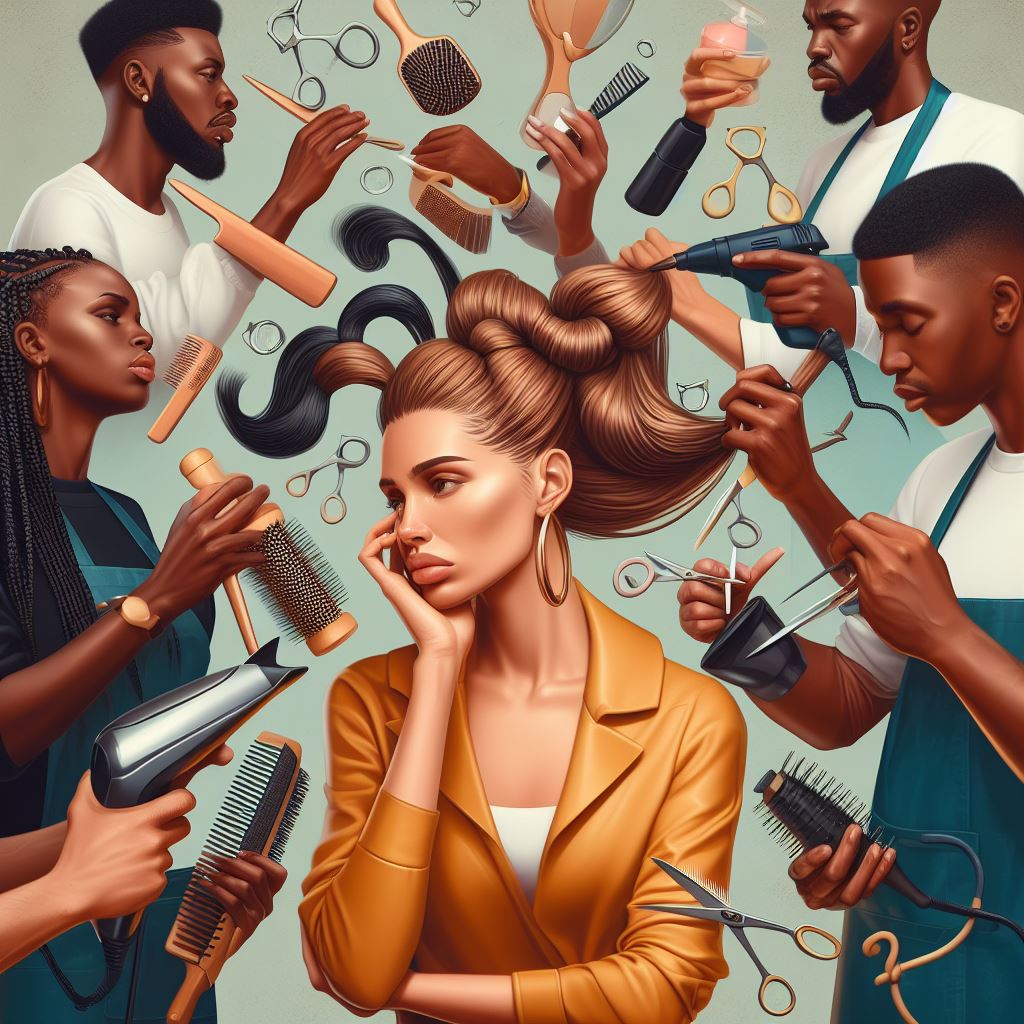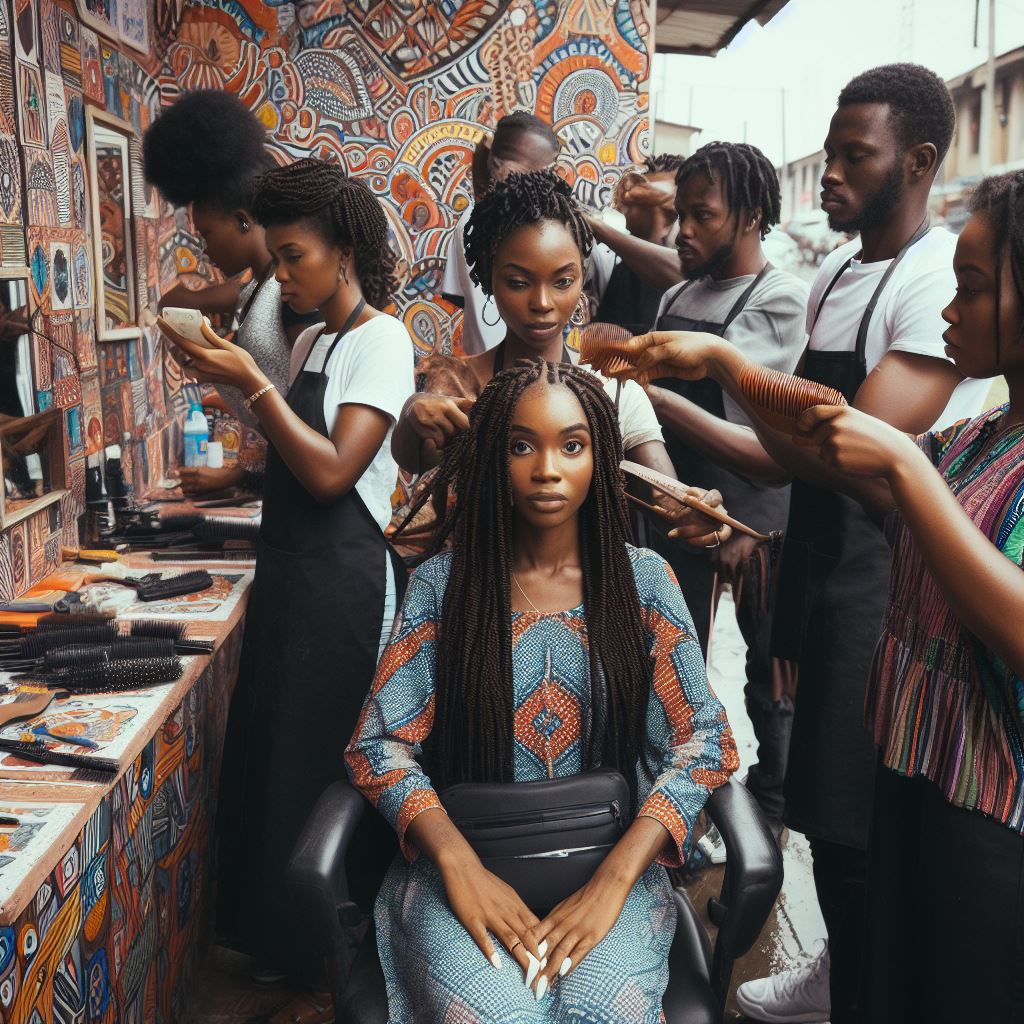Introduction
The hair styling industry in Nigeria stands as a pivotal force, weaving its significance into the fabric of both the nation’s economy and cultural heritage.
Amidst the vibrant tapestry of its contributions, challenges persist, demanding careful consideration and innovative solutions.
At the forefront of these challenges is the pressing issue of inadequate training and education opportunities.
Aspiring hair stylists often find themselves grappling with a scarcity of resources to hone their craft, leading to a noticeable impact on service quality.
The struggle to meet client expectations becomes palpable, creating ripples of adversity for businesses.
Beyond education, the hurdles extend to the procurement of high-quality hair products and equipment.
The industry’s reliance on these elements is hindered by their limited availability and soaring costs, posing formidable barriers to delivering top-notch services.
The consequences are far-reaching, resulting in a decline in overall industry standards and thwarting its potential for growth.
Moreover, the lack of tailored government support and regulation compounds the challenges faced by hair stylists in Nigeria.
The absence of cohesive policies leaves stylists without a framework for success, hindering both individual ventures and the industry’s collective contribution to the nation’s economy.
In essence, the multifaceted challenges confronting hair stylists in Nigeria’s industry necessitate strategic interventions.
Prioritizing comprehensive training and education, improving access to quality products, and advocating for supportive government policies can catalyze the industry’s transformation.
Recognizing the indispensable role of this sector, it becomes imperative to cultivate an environment conducive to the success and growth of hair stylists in Nigeria.
The journey ahead involves not just overcoming challenges but sculpting a landscape that nurtures the flourishing of this vital industry.
Nigeria’s Hair Styling Industry
In Nigeria, the hair styling industry is a thriving sector that has gained significant popularity among both men and women.
The industry caters to various hair needs, including cutting, styling, coloring, and braiding.
Overview of the Hair Styling Industry in Nigeria
The hair styling industry in Nigeria is a dynamic and vibrant sector that continues to evolve over time. It is driven by a combination of traditional and modern hair styling techniques, making it unique and diverse.
The industry is comprised of numerous hair salons, barbershops, and hairstylists offering an array of services to meet the demands of the Nigerian population.
These establishments range from small local businesses to high-end salons.
The growth and popularity of the industry can be attributed to Nigeria’s cultural diversity, fashion trends, and the desire for individuals to express themselves through their hair.
Nigerians have embraced different hairstyles, including traditional braids, weaves, wigs, and natural hair styles.
Growth and Contribution to the Economy
The hair styling industry in Nigeria has experienced significant growth in recent years. This growth can be attributed to various factors, including the increasing population, rising disposable income, and the influence of social media.
The industry has created employment opportunities for many Nigerians, both as hairstylists and salon owners.
It has become a source of income for skilled individuals, contributing to economic growth and poverty reduction.
Furthermore, the hair styling industry has stimulated the growth of the beauty product market in Nigeria.
With the increased demand for hair products such as shampoos, conditioners, styling gels, and treatments, local manufacturers have emerged to meet this need, boosting the nation’s economy.
Salons and hair care products also attract tourists and foreigners, contributing to Nigeria’s tourism sector.
Many visitors are interested in experiencing the local hair styling techniques, cultural hairstyles, and purchasing unique hair products.
Challenges Faced by Hair Stylists in Nigeria’s Industry
Despite its growth and success, hair stylists in Nigeria’s industry face several challenges that hinder their progress and profitability. These challenges include:
- Lack of Professional Training: Many hairstylists lack formal education and professional training, which affects the overall quality of services they provide.
- High Competition: The industry is highly competitive, with numerous salons and hairstylists vying for clients, making it difficult to stand out from the crowd.
- Power Supply: Frequent power outages in Nigeria pose a significant challenge for hair stylists as it interferes with their ability to provide services and operate effectively.
- Imported Hair Products: The reliance on imported hair products increases operational costs for hair stylists, making it challenging to offer affordable services.
- Changing Fashion Trends: Keeping up with rapidly changing fashion trends and hairstyles requires continuous learning and investment in new techniques and equipment.
Despite these challenges, the hair styling industry in Nigeria is resilient and continues to flourish, providing employment opportunities and contributing to the country’s economy.
Overall, Nigeria’s hair styling industry plays a vital role in promoting self-expression, cultural identity, and economic development, making it an essential and thriving sector in the country.
Read: Hair Styling in Nigeria: A Guide to the Profession
Lack of Education and Training
The hair styling industry in Nigeria, vibrant and diverse as it may be, encounters a formidable obstacle – the scarcity of educational and training opportunities.
This deficiency adversely affects the proficiency and creativity of hair stylists, ultimately impacting the industry’s competitiveness.
Inadequate training leaves hair stylists without the essential knowledge and skills required to deliver top-notch services to their clients.
This limitation manifests in subpar styling techniques and a lack of innovative options.
Most hair stylists in Nigeria receive only rudimentary training, which hinders their ability to stay current with trends and evolving techniques.
What’s needed is a revolution in the form of comprehensive, specialized training programs tailored to Nigeria’s hair stylists.
These programs should encompass a wide spectrum, from advanced cutting and coloring techniques to hair care and customer service.
Investing in education and training is not just a boon for the stylists themselves but also for their clients.
Armed with a deeper understanding of hair types, textures, and scalp conditions, stylists can offer personalized services.
Moreover, the dearth of ongoing education opportunities stunts the professional growth of hair stylists.
Without access to continued learning, they struggle to keep up with industry advancements, potentially losing clients to better-trained peers.
The solution lies in collaborative efforts between the government and industry stakeholders.
By establishing accredited training institutions and offering financial support in the form of subsidies or scholarships, we can empower aspiring hair stylists to pursue formal education.
In addressing these challenges, Nigeria’s hair styling industry can elevate its reputation and competitiveness.
Clients will have greater confidence in the skills of hair stylists, leading to increased business growth.
Moreover, well-trained stylists can contribute to the overall development and professionalism of the industry, cementing its position as a vital part of the nation’s beauty landscape.
Challenges Faced by Hair Stylists in Nigeria’s Industry
Limited Access to Professional Tools and Products:
- Hair stylists in Nigeria face significant challenges when it comes to acquiring professional tools and products.
- Due to various factors such as import restrictions, high costs, and limited availability, accessing high-quality tools becomes difficult.
- These challenges can hinder the ability of hair stylists to provide top-notch services and meet customer expectations.
Implications of Using Substandard Equipment and Products:
- The use of substandard equipment and products can significantly impact the quality of hair styling services provided.
- Low-quality tools may result in inefficient and ineffective hair treatments, leading to unsatisfied customers.
- Substandard products can have adverse effects on clients’ hair, causing damage and hindering their overall experience.
- Negative customer experiences can lead to a decrease in client retention and potential loss of business for hair stylists.
Highlighting the Need for Better Access to High-Quality Tools and Products:
- It is crucial for hair stylists in Nigeria to have better access to high-quality tools and products.
- Improved access would allow stylists to enhance the overall quality of their services, resulting in higher customer satisfaction.
- High-quality tools and products can lead to better outcomes and contribute to the growth of the hair styling industry.
- Governments and industry stakeholders should work together to address import restrictions and provide subsidies for professional tools.
- Implementing measures to ensure affordable and accessible high-quality tools would benefit both hair stylists and their clients.
In general, limited access to professional tools and products poses significant challenges for hair stylists in Nigeria.
Using substandard equipment and products can negatively impact the quality of services provided, leading to client dissatisfaction.
Therefore, it is crucial for the industry to prioritize better access to high-quality tools and products to improve overall service quality and customer satisfaction.
Read: International Views: Fundraising in Nigeria Compared

Inadequate Government Support
The hair styling industry in Nigeria grapples with formidable challenges, primarily stemming from the lack of government support.
A crucial issue lies in the absence of supportive policies and regulations, making it arduous for professionals to establish and expand their businesses.
Burdened by exorbitant taxation and licensing fees, hair stylists find their financial resources strained, hindering their operational success. The dearth of funding options further stifles growth, limiting investments in infrastructure, equipment, and training.
The skills gap widens due to inadequate government support, leaving stylists struggling to stay abreast of the latest trends. Limited market access compounds the problem, hampering the growth and visibility of local talents.
The industry’s potential to contribute significantly to Nigeria’s economy remains largely untapped, missing out on job creation, entrepreneurship, and revenue generation.
Government intervention is paramount for addressing these challenges.
Collaboration with the education sector, promotion of local brands, industry recognition, and encouragement of entrepreneurship can transform the landscape.
Enhanced consumer protection, achieved through government regulations, ensures the safety and satisfaction of customers, benefiting the industry as a whole.
In short, recognizing the pivotal role of the hair styling industry and implementing proactive measures is imperative for its growth and sustainability.
Read: Building Trust: Transparency in Fundraising in Nigeria
Competition and Price Wars
- The hair styling industry in Nigeria is fiercely competitive.
- There is an abundance of talented hair stylists in the country.
- Salons are constantly competing for clients and trying to attract new customers.
- Price wars are common among hair stylists in Nigeria.
- Salons often offer discounted rates and promotions to lure customers away from competitors.
- While price wars may initially benefit customers, they have negative effects on businesses.
- Price wars lead to a decrease in profit margins for salons.
- Salons may struggle to cover their expenses and maintain sustainability.
- Reduced income for hair stylists may impact their quality of work and motivation.
- Salons may be forced to cut corners and compromise on the quality of products used.
- Customers may perceive low prices as an indication of poor service quality.
- Offering exceptional customer service is crucial for attracting and retaining clients.
- Providing personalized consultations and tailoring services to individual needs can set a stylist apart.
- Staying up-to-date with the latest trends and techniques is important in a competitive industry.
- Investing in continuous education and training can enhance a stylist’s skills and reputation.
- Creative marketing strategies can help stylists reach a wider audience.
- Utilizing social media platforms to showcase their work and engage with potential clients can be effective.
- Collaborating with complementary businesses, such as makeup artists or fashion designers, can expand a stylist’s reach.
- Creating a unique brand identity and offering specialized services can attract a niche market.
- Tapping into the growing demand for natural hair care can also be a profitable way to differentiate.
- Collaborating with local beauty influencers or celebrities can help raise a stylist’s profile.
- Participating in industry events and competitions can showcase a stylist’s talent and expertise.
- By embracing creativity, innovation, and professionalism, hair stylists can thrive in Nigeria’s competitive industry.
Cultural and Social Bias
When it comes to the hair styling industry in Nigeria, hair stylists face numerous cultural and social biases that hamper their progress and development.
These biases stem from deep-rooted societal beliefs and perceptions, which portray hair styling as an inferior and not a respectable profession.
In this section, we will explore these biases, discuss the perception, and highlight the importance of changing societal perspectives and promoting professionalism in the hair styling industry.
1. Cultural Biases
- Traditional gender roles often dictate that men should have more prestigious professions, whereas women are expected to pursue careers in nurturing fields like nursing or teaching.
- Historical stereotypes have perpetuated the idea that hair styling is a profession meant for women, leading to the devaluation of male hair stylists in Nigerian society.
- Hair styling is often associated with lower social status due to the perception that it is a skill that can be easily acquired without formal education or training.
- In some cultural settings, hair stylists are stigmatized and seen as individuals who engage in superficial activities that do not contribute to society’s growth and progress.
- The lack of recognition and admiration for hair stylists in Nigerian cultural events and ceremonies reinforces the notion that their profession is not significant.
2. Social Biases
- Society tends to undervalue the skills and expertise required for successful hair styling, considering it as a simple task that anyone can perform.
- Hair stylists often face discrimination when seeking access to resources such as loans, business advice, or professional networks due to the societal bias against their profession.
- The perception that hair stylists primarily cater to women’s beauty needs furthers the bias against male hair stylists, making it difficult for them to find clientele.
- Social media platforms and beauty standards perpetuate the belief that natural hair is undesirable, leading to a preference for chemically-treated hairstyles and undermining the value of hair stylists skilled in natural hair care.
- Negative experiences with unprofessional hair stylists have created stereotypes and mistrust among potential clients, making it harder for professionals to gain recognition and respect.
3. Importance of Changing Perspectives
It is crucial to challenge and change these cultural and social biases for the growth and development of the hair styling industry in Nigeria. By doing so, we can:
- Encourage more individuals, regardless of their gender, to pursue a career in hair styling without feeling stigmatized or judged.
- Promote diversity and inclusivity within the industry by appreciating all hair types and textures, leading to better representation and opportunities for hair stylists.
- Educate society on the complexity and creativity involved in hair styling, emphasizing the need for formal training and continuous professional development.
- Support hair stylists in accessing resources, such as business support and financial assistance, to establish and expand their businesses.
- Redefine beauty standards to appreciate and embrace natural hair, encouraging the development of specialized skills in natural hair care within the industry.
In fact, cultural and social biases continue to pose significant challenges for hair stylists in Nigeria’s industry.
However, by recognizing the importance of changing societal perspectives, promoting professionalism, and challenging traditional norms, we can create a more inclusive and respectful environment for hair stylists to thrive and contribute to society.
Read: Becoming a Hair Stylist in Nigeria: What to Know
Conclusion
Hair stylists in Nigeria’s industry face several challenges. These include a lack of formal training and education, inadequate infrastructure, and stiff competition.
Additionally, the industry lacks recognition and support from the government.
To address these challenges, collective efforts are needed. Stakeholders, including the government, should invest in training programs and workshops to enhance the skills of hair stylists.
They should also provide the necessary infrastructure such as well-equipped salons and quality hair products.
Despite these challenges, there is optimism for the future of the hair styling industry in Nigeria.
The demand for professional hair services continues to grow, and with the right support, talented hairstylists can thrive. The industry has the potential to contribute significantly to the country’s economy and create employment opportunities.
In the end, addressing the challenges faced by hair stylists in Nigeria’s industry requires collaboration and support from all stakeholders.
By recognizing the importance of this sector and implementing measures to overcome the obstacles, the hair styling industry can flourish and contribute to the growth and development of Nigeria’s economy.




